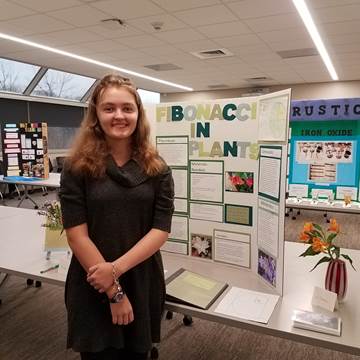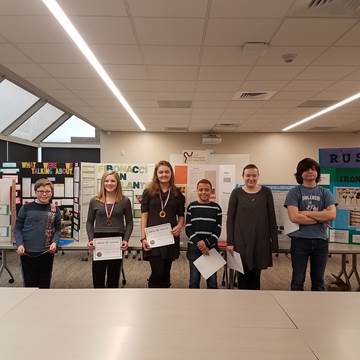Enrollment Now Open for Second Semester. Click Here
Enrollment Now Open for Second Semester. Click Here
There’s a first for everything, and this year CCA held its first science fair for our middle and high school cyber students in grades 6-12. Traditionally, cyber schools do not hold science fairs. However, several CCA Science National Honor Society students decided to plan a science fair after their adviser, Julianna Schweinsburg, brought the idea to their attention. The hope was to get other students excited about science.
Schweinsburg, a CCA high school biology teacher, helped bring the students’ dreams to reality. It is hard for a cyber school to have even one science fair, but CCA held four from March 12-16 at its Family Service Centers in Dickson City, Harrisburg, Pittsburgh and Philadelphia.
Students who wanted to participate received a packet with instructions on how to design a hypothesis and information about the scientific methods they had to use to have a successful experiment. Because many students had never participated in a science fair, they had a new experience learning the process from start to finish.
“I’m hoping this builds students’ interest in science in general and expand[s] some of [the students’] ideas of what it means to be studying in a science field,” Schweinsburg said.
The project required students to decide on an area of interest they wanted to investigate, narrow down a testable question, run the experiment based on the question and record the results.
Experiments were meant to be challenging yet fun for students. All of the experiments were done in the comfort of students’ homes.
Determining a project for the fair was no easy task for some students. The experiment itself was time-consuming, and projects fell across many areas of science, from chemistry and biology to zoology and animal science.
To participate, students needed to record their tests and findings on a trifold poster and turn it into a visual presentation. Students did not make formal presentations, but teachers circled around, asking for explanations to the projects.
Students who earned first, second and third places received medals.
“I would love for this to turn into a yearly thing for students to participate in, ” Schweinsburg said.


Enrollment Now Open for Second Semester. Click Here